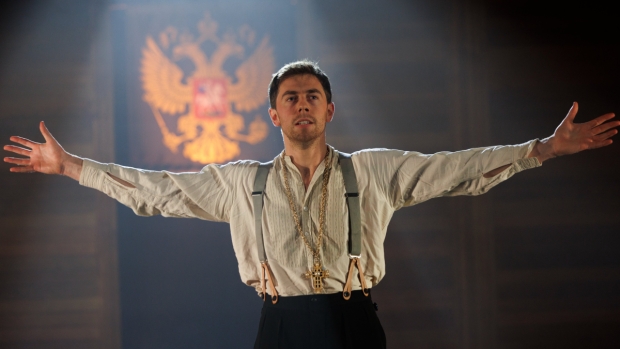”Dmitry” at the Marylebone Theatre – review

© Ellie Kurttz
Based on an unfinished play by Friedrich Schiller about a short-lived 17th-century Russian Tsar, Dmitry has clear contemporary resonance. For one thing, it shows how far back the Western-Russian tensions we see playing out so disastrously in Ukraine go, and how deeply rooted they are in religion.
This new version by Peter Oswald, a noted Schiller interpreter, opens the new Marylebone Theatre, located at Rudolf Steiner House. It’s an appropriate choice seeing as Steiner himself was an enthusiastic proponent of the play, which, among many things, explores the way stories can be altered to suit competing causes.
In this case, that story is of a man who believes himself to be the lost (presumed dead) youngest son of Ivan the Terrible, and is co-opted by the Polish and Cossacks to rule Russia in their interest. Much of their success hinges on the testimony of Dmitry’s mother, the former Tsarina, whose own motivations are coloured by her desire to avenge her son’s murderer, Boris Godunov, who now sits in the Kremlin.
It all seems nicely set up for a drama of power, politics and familial betrayal, but unfortunately, Oswald’s script soon gets bogged down by the weight of its own exposition. We get occasional glimpses of its poetic potential – Godunov (a stand-out performance by Daniel York Loh) speaks fanatically of the West, and the Pope in particular, “sprawling towards us”. But mostly it feels like wading through a long (2 hours 45 minutes to be precise) and laborious history lesson.
Tim Supple’s surprisingly workmanlike production does little to help matters. There are some stylistic flourishes; when the forces clash, rubbish is strewn around to indicate the destruction of conflict, and the climax features a series of slow-motion tableau. But overall, the choreography is flat and episodic, with scenes bookended by entrances and exits that feel clunky. It doesn’t help that Robert Innes Hopkins’ anaemic wood-panelled design retains the feel of the former lecture hall the theatre occupies.
There is plenty of established talent on show, from Mark Hadfield as Polish leader Prince Mnishek (doubling as truth-teller Razin) to Poppy Miller as Dmitry’s anguished mother Maria. Relative newcomer Aurora Dawson-Hunte also impresses as Marina, Mnishek’s daughter and Dmitry’s betrothed, while Tom Byrne lends admirable poise to the title role. It’s an impressive 16-strong ensemble, so more’s the pity they’re labouring with such leaden material.
It’s always a pleasure to welcome a new theatre to the fold, and Supple’s return to the London stage is also cause for cheer. But, topical as it may be, this opening production fails to deliver a suitably celebratory inauguration.












